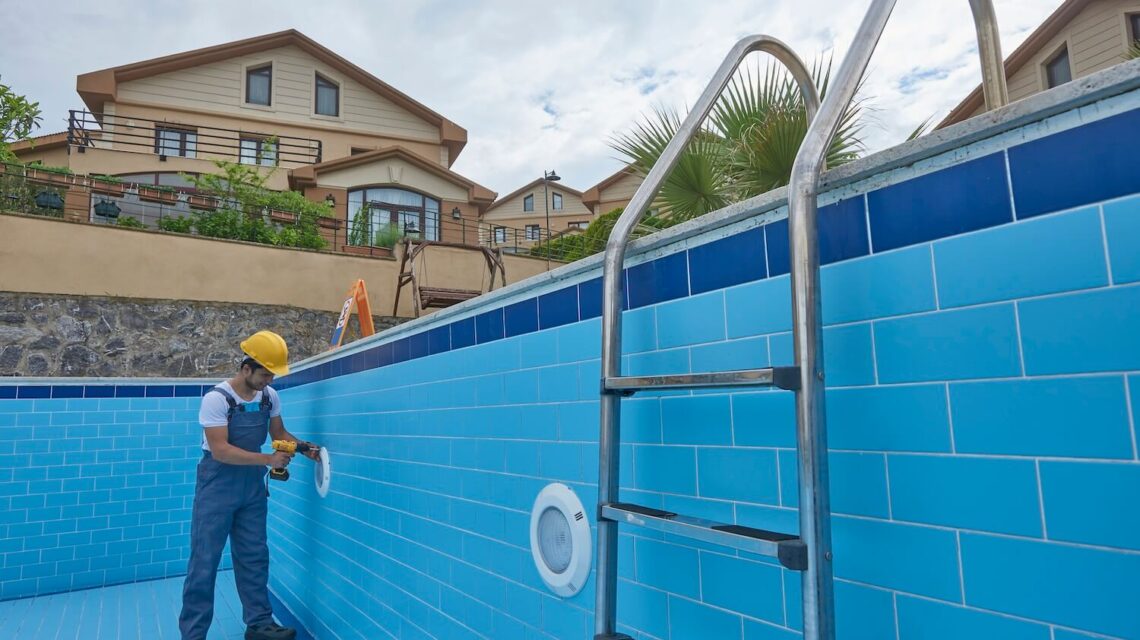A backyard pool is the epitome of relaxation and enjoyment during hot summer days. However, with great pleasure comes great responsibility, especially when it comes to maintenance and repairs. While some pool repairs are simple enough for a DIY enthusiast to tackle, others require the expertise of a professional. Knowing when to roll up your sleeves and when to pick up the phone can save you time, money, and potential headaches.
In this comprehensive guide, we’ll explore various common pool repairs, detailing what you can handle yourself and when it’s best to leave it to the pros.
Understanding Home Pool Components
Before delving into repairs, it’s essential to understand the basic components of a pool. This knowledge will empower you to diagnose issues accurately and determine whether you can address them independently.
- Pool Structure: The pool’s structure comprises the shell, typically made of concrete, fiberglass, or vinyl, along with the coping and decking.
- Filtration System: This includes the pump, filter, and skimmer, responsible for circulating and cleaning the water.
- Plumbing: The network of pipes and valves that transport water to and from the pool and its various components.
- Electrical System: Powering components like lights, heaters, and automated systems.
DIY Repairs You Can Tackle
- Unclogging Skimmer Baskets: Skimmer baskets collect debris to prevent it from reaching the pump. Simply remove the basket, clean it, and reinstall it regularly to maintain proper water flow.
- Cleaning Filters: Depending on the type of filter (sand, cartridge, or diatomaceous earth), cleaning involves backwashing, hosing down, or replacing the filter media. Refer to your filter’s manual for specific instructions.
- Repairing Minor Leaks: If you notice a small leak, you can attempt to patch it yourself using a pool repair kit. Drain the water to below the level of the leak, clean and dry the area, apply the patch according to the kit’s instructions, and allow it to cure.
- Replacing Pool Lights: Burnt-out pool lights are a common issue. With the power turned off, remove the light fixture, disconnect the wiring, and replace the bulb or entire fixture as needed.
- Adjusting pH Levels: Regularly test your pool water and use pH adjusters as necessary to maintain a balanced pH level, typically between 7.2 and 7.6, to prevent corrosion and algae growth.
- Cleaning Pool Walls and Floors: Use a pool brush or vacuum to scrub algae and debris from the pool’s surfaces regularly to prevent staining and maintain water clarity.
When to Call a Professional
While DIY repairs can save you money, and time, and provide a sense of accomplishment, there are instances when it’s best to leave certain tasks to trained professionals.
Major Structural Damage
Cracks, bulges, or significant deterioration of the pool’s structure require professional assessment and repair to ensure structural integrity and prevent further damage.
Complex Plumbing Issues
Identifying and repairing leaks in the plumbing system can be challenging and may require specialized equipment and expertise. A professional plumber experienced in pool systems can accurately diagnose and repair plumbing issues.
Electrical Problems
Working with pool electrical systems can be dangerous and requires specialized knowledge to ensure safety and compliance with electrical codes. Any issues with pool lights, heaters, or automation systems should be addressed by a qualified electrician.
Liner Replacement
If your pool has a vinyl liner that is torn, wrinkled, or deteriorating, replacing it is a complex task best left to professionals who have the necessary skills and equipment to ensure a proper fit and seal.
Equipment Installation
Installing or replacing pool equipment such as pumps, filters, or heaters requires knowledge of plumbing and electrical systems. Improper installation can lead to equipment malfunction or damage, so it’s best to hire a professional to ensure proper setup and functionality.
Chemical Imbalance
While basic pH adjustment can be done by pool owners, correcting more complex chemical imbalances or treating algae blooms may require professional intervention to avoid further complications and ensure safe swimming conditions.
Preventive Maintenance for Long-Term Pool Health
In addition to addressing repairs as they arise, implementing a proactive preventive maintenance routine is key to ensuring the long-term health and functionality of your pool. Here are some essential preventive maintenance tasks to keep your pool in top condition:
- Regular Cleaning: Skim the pool’s surface daily to remove leaves, insects, and other debris. Additionally, vacuum the pool weekly to remove dirt and debris that settle on the bottom.
- Monitor Water Level: Keep an eye on the water level and ensure it remains within the optimal range. Refill the pool as needed to prevent damage to the pump and filtration system.
- Maintain Proper Water Chemistry: Test the water regularly for pH, chlorine, alkalinity, and calcium hardness levels. Adjust as necessary to keep the water balanced and free from bacteria and algae growth.
- Inspect Equipment: Routinely inspect pool equipment such as pumps, filters, heaters, and automation systems for signs of wear, damage, or malfunction. Address any issues promptly to prevent further damage or breakdown.
- Check for Leaks: Periodically inspect the pool and its plumbing system for signs of leaks, such as wet spots, water loss, or unusually high water bills. Addressing leaks promptly can prevent structural damage and water loss.
- Winterization: If you live in an area with cold winters, properly winterizing your pool is essential to prevent damage from freezing temperatures. This includes draining water from pipes and equipment, adding winter chemicals, and covering the pool with a winter cover.
- Professional Inspection: Schedule regular inspections with a qualified pool service technician to assess the overall condition of your pool, identify potential issues, and recommend necessary repairs or maintenance.
Advanced Tips for Home Pool Owners
For pool owners looking to take their maintenance game to the next level, here are some advanced tips and techniques to keep your pool in optimal condition:
Invest in Quality Equipment
When purchasing pool equipment such as pumps, filters, and heaters, opt for high-quality, energy-efficient models. While they may come with a higher upfront cost, they often offer better performance and durability, saving you money in the long run.
Upgrade to Automation
Consider installing a pool automation system to streamline and simplify pool maintenance tasks. Automation systems allow you to control various aspects of your pool, such as filtration, heating, and lighting, from your smartphone or tablet, saving you time and effort.
Install a Saltwater Chlorinator
Saltwater chlorination systems use salt to generate chlorine, eliminating the need to handle and store traditional chlorine chemicals. Not only is this method more convenient, but it also results in softer, gentler water that is easier on the skin and eyes.
Utilize Solar Heating
Harness the power of the sun to heat your pool with a solar heating system. Solar panels installed on your roof or nearby can heat your pool water for free, reducing energy costs and extending your swimming season.
Implement a Routine Maintenance Schedule
Create a detailed maintenance schedule outlining weekly, monthly, and seasonal tasks. Assign specific responsibilities to ensure that nothing falls through the cracks, and regularly review and update the schedule as needed.
Stay Informed
Keep abreast of the latest advancements and best practices in pool maintenance by reading industry publications, attending workshops or seminars, and joining online forums or communities of pool owners. Sharing knowledge and experiences with fellow enthusiasts can help you stay ahead of the curve and troubleshoot any issues that arise.
Conclusion
Maintaining a pool involves a combination of regular maintenance tasks and occasional repairs. While many minor issues can be addressed through DIY efforts, it’s essential to recognize the limitations of your skills and know when to seek professional assistance. By staying proactive with maintenance and addressing problems promptly, you can ensure that your pool remains a source of enjoyment for years to come. Remember, when in doubt, it’s better to err on the side of caution and call a professional to prevent potentially costly and hazardous mistakes.




